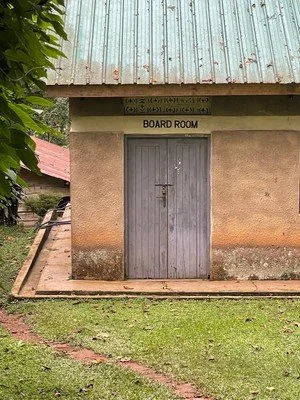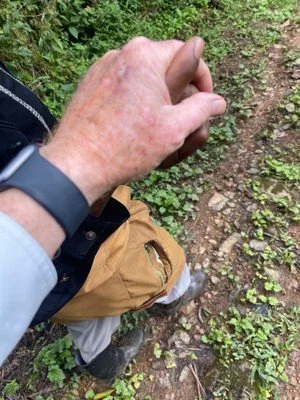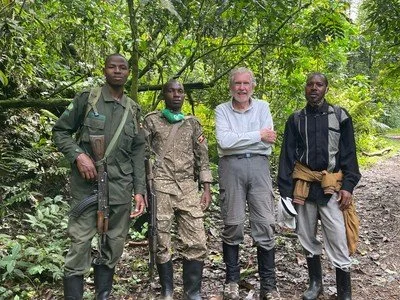Chapter Fourteen: The Ivy Trail
Today, I get my steps in--just like at home. Almost
12.10.2021 - 12.10.2021 75 °F
View Morocco + Uganda + Rwanda on paulej4's travel map.
The sun rises before I do. I can sleep in today. I sadly check out of Clouds Mountain Gorilla Lodge but not until 9:00. Des and Kim and Bosco and Edin have taken good care of me and the accommodations have been wonderful. Abdul arrives to call for me a few minutes early and then takes me to Nteko Village to meet my guide, Agatha, who will lead me on a walk estimated to last 4 to 5 hours through Bwindi Forest to Buhoma--the northern part of Bwindi. Abdul will drive the long road and meet me at today's destination: Bwindi Lodge.
Agatha is right on time but our ranger guards are late. Soon, however, Mathias and Mariko, AK47s slung over their camouflaged shoulders arrive on the scene. Agatha makes it clear that she is none to happy with their tardiness but within seconds, as it should be, that is in the past and they pile into the Land Cruiser as we make our way to our starting point about ten minutes down the road.
When I say down the road, that is what I mean. There are no speed bumps in this part of Uganda as the road itself serves that purpose. At one point Abdul struggles a bit with the four-wheel drive hubs and engagement but that hiccup is soon behind us as well.
At the drop off point, Geoffrey appears. He will serve as my porter on this adventure. His helping hand will get me through the day.
I enquired of Abdul, Kim and Des about what to expect but none of them could tell me much about the terrain I will have to traverse. If it is like days past, I told them, I wanted to skip it. There is so much exertion involved in this journey that a replenishment of energy is a necessity. They were all sure it would be fine--but they based that estimation on not many facts. I decided to wear my hiking boots rather than my muck boots. Footwear is important because I rubbed a raw spot on my left heel two days ago.
Proper footwear is based on one factor unknown to me: ants. I knew about mud and muck and rocks and roots and much more but the ant precautions were a surprise. One dons their socks--for me two pairs to make my hiking boots more snug. Then, as I did years ago in the U.S. Army, you blouse your trousers into your socks and then lace your boots. Then, you don "gators" which are similar to old-fashioned spats. Made of a rugged material, the have a loop that goes under the soles of your footwear, then either zip or velcro up the side of your calves to then be strapped to your leg just below the knee. Should you brush against something thorny, you are protected.
Should you interrupt a convoy of safari ants, they have a lot of work to do to get to your body. I brought a pair of gators that I bought online but the loaner gators from Clouds Mountain Gorilla Lodge were superior to mine so I happily used theirs. Until today at least.
Under way at 9:45, the beginning of our "walk" was downhill over rough, rocky terrain--the kind of surface under foot where it would be easy to trip and fall or sprain an ankle. My selection of hiking boots was best for this. Soon, however, we found low spots where mud as three to five inches deep. My muck boots would have been best for this. The conclusion you may accurately draw is that neither set of footwear was perfect. At one point we had to follow a stream bed such as a convict just escaped from prison might to throw the bloodhounds off the scent.
With my stamina tested, I have learned that on these "walks" or "hikes" or whatever you would like to label them, when your limbs are fatigued, you get lazy about lifting your trailing foot high to take the next step. That mistake will land you on your face because there is much to grab the lazy toe.
At the Ivy River, we crossed from agricultural land into Bwindi proper. This forest was, until 1992, occupied by the Batwa people (pygmies) who were essentially forced out in order to save the gorillas. Controversial and negotiated to obtain the best mutually advantageous outcome possible, the Batwa clearly suffered as they were forced to acclimate to a culture unknown to them. They had to wear clothes, for example.
As one hikes in Uganda the blessing and curse of angularity becomes clear. Going downhill, it is easy to trip head first and end up with your face planted in jagged rocks. The knees and heels and toes protest. But the lungs are happy. Going uphill, it is easy to trip head first but the ground is nearer so it is easier to block your fall with an outstretched hand. However, that hand will find unfriendly surfaces. It is best to not trip. The lungs don't particularly favor going uphill as you breathe more frequently--pant perhaps--in order to provide oxygen to your bloodstream. On the flat, you are in mud or muck a good portion of the time. You struggle to find the most stable and dry portion of the path which can be tricky. For me, all these hikes are difficult as I am used to smooth pavement and flat surfaces broken only by the occasional hill.
There are other issues with which to deal. Safari ants may be marching across your path. Disturb them at your peril. A serpent may linger in the grass--perhaps something harmful or perhaps a poisonous black mamba. At one point we are beneath a group of acrobatic red-tailed monkeys swinging in the trees and Agatha explains to me how they might attack a black mamba as a group. One goes for the head, another for the tail, the others essentially lining up along the length of the snake. Immobilized at maximum length, the snake is defeated. It is decapitated and the body is consumed by the red tails. These same monkeys battle chimpanzees from time to time with victory in doubt.
This is not only a recreational route.
The locals take this path to market. Many are barefooted. Recall my previous discussion about the walking surface and weight that reality in your mind for a moment. The older or younger you are, the less likely you are to wear footwear of any kind. I can not begin to imagine the calloused soles these intrepid walkers must have. Often, the women are toting loads atop their heads, sometimes steadied by an arm and sometimes balanced nonchalantly. Humorous to me, I see many backpacks balanced atop heads rather than worn on the back. More often, the backs of women are occupied by babies.
After about two hours of this, we meet up with two more guards Victor and Caleb who relieve Mathias and Mariko who go back the way we came to their posts. I tip them for their efforts on my behalf. Only fifteen minutes or so after that, we stop for lunch just past noon. Clouds has packed me a BLT wrap and included a banana. I have been saving my banana from previous lunches so I give one to Victor, one to Caleb and one to Geoffrey. They seem both surprised and pleased.
At this resting point Agatha gets out the park map to show me where we are and how we got there. I ask about Abdul's routing and she explains that as well.
At one point we pass some younger people on the trail and both Victor and Agatha notice that they are eating donut gems from cellophane wrappers and warn them sternly not to litter. We see beautiful mahogany trees, giants ferns and much more. Birds call, monkeys scamper and, at one point, we see where gorillas have recently crossed.
Nearing the end of the trail we pass the Bwindi Park Headquarters Building, the most modern and upscale structure I've seen (other than my lodges) in days. Right after that, I find the Board Room so I go looking for B4 but do not find her anywhere around.
By 1:45, we are at the Bwindi lodge where I welcomed warmly with a pair of clogs and requested to hand over my gators, boots and socks for cleaning. I happily oblige. To the main room of the lodge I go where I am treated to a glass of juice. Thinking ahead, I realized that Abdul would be a few hours behind me in his arrival here. He would have all my clothing, etc. with him. I thought to stash my laptop and electric charger for my porter to carry so that I could write upon arrival at Bwindi. The fruit of that decision is what you have just digested.
Around 4:30 Abdul arrives with my luggage just as it starts to rain. I make my way to my banda (which is a mirror image of the one at Mt. Gahinga Lodge) and Dina, my butler, shows me around. I grab a hot shower in order to get back to the main building in time to meet with someone Abdul has persuaded to come see me from the local hospital. I need to figure out how to get a covid test right before I make my way into Rwanda. The representative arrives and we arrange for a test tomorrow afternoon with the results coming back in the evening time. That will give me enough time to upload the test results into a Rwandan government visitor locator form which should allow me to board my flight to Kigali about 48 hours from now.
Then, of course, I'll need another test upon arrival while I quarantine at the Kigali Marriott. Frankly, the idea of quarantining at the Kigali Marriott has a certain appeal. But there will be more on that story tomorrow and the next day. As I wait for my dinner, I note that the lodge staff is decorating for Christmas. Their main ornaments consist of lots of green balloons. It has become our practice for B4 and I to chat using WhatsApp while I have my dinner. I am anxious to see if she is available; 7:00pm my time, 10:00am her time.
Tomorrow I have my final gorilla adventure before heading to Rwanda. It has been raining steadily here so the terrain may be much different from al that I have encountered before. In case you are wondering, yes, I have a rain suit. And muck boots will be the order of the day--even though they are the ones that wore a blister on my left heel.





